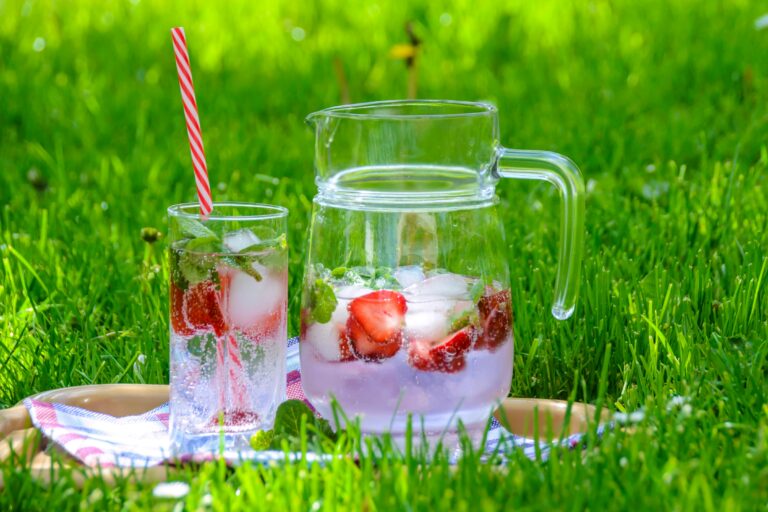Sip Smart: Summer Hydration Tips

Taking care of your health is more than eating a healthy diet and staying active; drinking plenty of fluids to stay hydrated is an important part of good health. Our bodies are about 60% water, and every system in our body depends on water. Water is essential for regulating body temperature, lubricating joints, delivering nutrients to cells, preventing infection, and keeping organs functioning properly. Being well-hydrated also helps to improve digestion, sleep, brain function, and mood.
In the heat of the summer, water is lost through sweat which increases our fluid needs. Being active outside on hot days further increases fluid needs due to increased water loss in sweat.
Adults over age 60 are at a higher risk for becoming dehydrated from a decreased thirst response that occurs with aging. In addition, many older adults take diuretics that increase fluid loss and other medications that may affect their hydration status.
The universal recommendation is to drink about 8 glasses of water per day, though this figure can vary a bit based on body weight and activity level. The easiest way to keep a handle on your hydration is to pay attention to the color of your urine. Pale and clear urine is the goal and means you are well-hydrated. If it’s a dark yellow color, it means you should drink more fluids.
Water is the best choice for hydration. Other good options include drinks like coffee, tea, club soda, and unsweetened seltzers. There are other ways to meet your fluid needs, but not all choices are created equal. Many drinks like soda, fruit juice drinks, sweet tea, alcoholic beverages, and energy drinks contain empty calories, added sugar, and caffeine.
How much sugar is in our drinks?
- 12 oz can of regular soda contains about 39 grams of sugar, which is almost 10 teaspoons.
- 12 oz sweet coffee drink, such as a café mocha, has about 27 grams of sugar, equating to 7 teaspoons.
- 12 oz Gatorade contains 48 grams of sugar, or 12 teaspoons.
- Small sweet tea from Chick-fil-A has 20 grams of sugar, which equals 5 teaspoons.
- 16 oz Monster Energy drink contains 54 grams of sugar, or about 14 teaspoons.
- 12 oz orange juice (no sugar added) has about 28 grams of sugar, or 7 teaspoons.
Alcohol and hydration
Since alcohol is a diuretic, it causes fluid loss which can lead to dehydration. Alcohol is considered empty calories because it does not offer any nutritional benefits. Many alcoholic beverages, especially when mixed into cocktails, contain added sugar as well. If you choose to drink alcohol, drink water too and play close attention to the color of your urine to avoid dehydration.
Other hydrating options
About 20% of our fluid intake comes from the food we eat. Some foods have a high-water content that can help us stay hydrated, including:
- Melons like watermelon, honeydew, and cantaloupe
- Strawberries
- Pineapple
- Peaches
- Oranges
- Bell Peppers
- Broccoli
- Celery
- Cucumber
- Lettuce
- Summer squash like zucchini and yellow squash
Soups and broths also have a high-water content and can help to meet fluid needs. Low-fat milk and yogurt and small amounts of fruit juice with no added sugar are other options to boost your fluid intake.
Try one of these infused water recipes to mix up your water routine:
Infused Water
adapted from simplejoy.com
Ingredients
Lemon Rosemary Infused Water
- 3 sliced lemons
- 4 fresh rosemary sprigs
Strawberry Mint Infused Water
- 1 cup of fresh strawberries, trimmed and sliced
- 1 small handful of mint leaves
Orange Basil Infused Water
- 2 sliced oranges
- 1 small handful of basil leaves
Instructions
- For each recipe, combine the two ingredients in a 32-ounce mason jar or pitcher and fill with water.
- Allow the water several hours to infuse in the refrigerator. Drink within 48 hours.